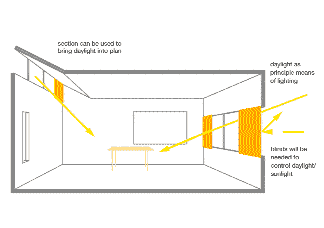|
key
daylighting considerations
|
Light-coloured reflective surfaces both inside and out can
also make a significant contribution to daylight levels.
Window blinds are essential for good viewing of a whiteboard
or screen (laptop, full size PC screen or electronic whiteboard).
They need not give a complete blackout but must screen out
direct sunlight. Blinds or some other method of shading will
be needed in any space where direct sunlight penetration is
likely. Dedicated video-conferencing rooms and most performance
spaces will require blackout facilities (and good acoustic
conditions).
|

|
Good electric
lighting is just as important as daylighting, particularly as extended
opening hours will mean an increased reliance on it. The recommended
background lighting levels given in building bulletin 87 (350 lux
in general teaching areas and 500 lux for detailed work such as painting)
should not be exceeded. If more light is needed for a specific purpose
it is best to provide task lights.
Luminaires with specular-type louvres
are not needed for computers except perhaps in dedicated computer
suites. Uplighting and wall-wash lights can be used to illuminate
the ceilings and walls. Good lighting is especially important for
lip-reading and downlighting should be avoided because of the shadows
it casts. A dimming facility provides flexibility and is particularly
useful for lights close to an electronic whiteboard. External lighting
is important for building security and the safety of occupants, particularly
as evening use increases. Emergency lighting may be needed for out
of hours community use. |
